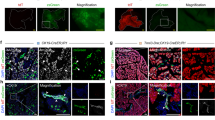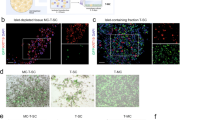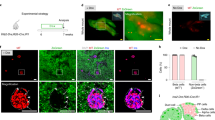Abstract
Genetic manipulations, with or without lineage tracing for specific pancreatic cell types, are very powerful tools for studying diabetes, pancreatitis and pancreatic cancer. Nevertheless, the use of Cre/loxP systems to conditionally activate or inactivate the expression of genes in a cell type– and/or temporal-specific manner is not applicable to cell tracing and/or gene manipulations in more than one lineage at a time. Here we report a technique that allows efficient delivery of dyes for cell tagging into the mouse pancreas through the duct system, and that also delivers viruses carrying transgenes or siRNA under a specific promoter. When this technique is applied in genetically modified mice, it enables the investigator to perform either double lineage tracing or cell lineage tracing combined with gene manipulation in a second lineage. The technique requires <40 min.
This is a preview of subscription content, access via your institution
Access options
Subscribe to this journal
Receive 12 print issues and online access
$259.00 per year
only $21.58 per issue
Buy this article
- Purchase on Springer Link
- Instant access to full article PDF
Prices may be subject to local taxes which are calculated during checkout



Similar content being viewed by others
References
Weir, G.C. & Bonner-Weir, S. Islet beta cell mass in diabetes and how it relates to function, birth, and death. Ann. NY Acad. Sci. 1281, 92–105 (2013).
Werner, J. et al. Advanced-stage pancreatic cancer: therapy options. Nat. Rev. Clin. Oncol. 10, 323–333 (2013).
Magnuson, M.A. & Osipovich, A.B. Pancreas-specific Cre driver lines and considerations for their prudent use. Cell Metab. 18, 9–20 (2013).
Xiao, X. et al. No evidence for beta cell neogenesis in murine adult pancreas. J. Clin. Invest. 123, 2207–2217 (2013).
Teta, M., Rankin, M.M., Long, S.Y., Stein, G.M. & Kushner, J.A. Growth and regeneration of adult beta cells does not involve specialized progenitors. Dev. Cell 12, 817–826 (2007).
Laukkarinen, J.M., Van Acker, G.J., Weiss, E.R., Steer, M.L. & Perides, G. A mouse model of acute biliary pancreatitis induced by retrograde pancreatic duct infusion of Na-taurocholate. Gut 56, 1590–1598 (2007).
Perides, G., van Acker, G.J., Laukkarinen, J.M. & Steer, M.L. Experimental acute biliary pancreatitis induced by retrograde infusion of bile acids into the mouse pancreatic duct. Nat. Protoc. 5, 335–341 (2010).
Jimenez, V. et al. In vivo genetic engineering of murine pancreatic beta cells mediated by single-stranded adeno-associated viral vectors of serotypes 6, 8 and 9. Diabetologia 54, 1075–1086 (2011).
Husain, S.Z. et al. Ryanodine receptors contribute to bile acid-induced pathological calcium signaling and pancreatitis in mice. Am. J. Physiol. Gastrointest. Liver Physiol. 302, G1423–G1433 (2012).
Wittel, U.A. et al. Taurocholate-induced pancreatitis: a model of severe necrotizing pancreatitis in mice. Pancreas 36, e9–e21 (2008).
Jose, A. et al. Intraductal delivery of adenoviruses targets pancreatic tumors in transgenic Ela-myc mice and orthotopic xenografts. Oncotarget 4, 94–105 (2013).
Loiler, S.A. et al. Localized gene expression following administration of adeno-associated viral vectors via pancreatic ducts. Mol. Ther. 12, 519–527 (2005).
Guo, P. et al. Specific transduction and labeling of pancreatic ducts by targeted recombinant viral infusion into mouse pancreatic ducts. Lab. Invest. 93, 1241–1253 (2013).
Xiao, X. et al. M2 macrophages promote beta-cell proliferation by upregulation of SMAD7. Proc. Natl. Acad. Sci. USA 111, E1211–E1220 (2014).
Xiao, X. et al. Neurogenin3 activation is not sufficient to direct duct-to-beta cell transdifferentiation in the adult pancreas. J. Biol. Chem. 288, 25297–25308 (2013).
Xiao, X. et al. Pancreatic duct cells as a source of VEGF in mice. Diabetologia 57, 991–1000 (2014).
Wang, Z. et al. Widespread and stable pancreatic gene transfer by adeno-associated virus vectors via different routes. Diabetes 55, 875–884 (2006).
Guo, P. et al. A simplified purification method for AAV variant by polyethylene glycol aqueous two-phase partitioning. Bioengineered 4, 103–106 (2012).
Guo, P. et al. Rapid and simplified purification of recombinant adeno-associated virus. J. Virol. Methods 183, 139–146 (2012).
Haurigot, V. et al. Whole-body correction of mucopolysaccharidosis IIIA by intracerebrospinal fluid gene therapy. J. Clin. Invest. 123, 3254–3271 (2013).
Khan, I.F., Hirata, R.K. & Russell, D.W. AAV-mediated gene targeting methods for human cells. Nat. Protoc. 6, 482–501 (2011).
Hajitou, A. et al. Design and construction of targeted AAVP vectors for mammalian cell transduction. Nat. Protoc. 2, 523–531 (2007).
Grieger, J.C., Choi, V.W. & Samulski, R.J. Production and characterization of adeno-associated viral vectors. Nat. Protoc. 1, 1412–1428 (2006).
Koerber, J.T., Maheshri, N., Kaspar, B.K. & Schaffer, D.V. Construction of diverse adeno-associated viral libraries for directed evolution of enhanced gene delivery vehicles. Nat. Protoc. 1, 701–706 (2006).
Acknowledgements
This work was supported, in whole or in part, by the Cochrane-Weber endowed Fund in Diabetes Research (X.X., NO19831) and the US National Institutes of Health (G.K.G., R01 DK098196).
Author information
Authors and Affiliations
Contributions
The concept of the study was designed by X.X. Surgery was developed and performed by X.X., P.G. and G.K.G. Viruses were produced by P.G. Surgery photographs were taken by K.P. Data were collected by X.X., P.G., K.P., C.S., L.P., S.F., I.G., Y.E.G., S.Z.H. and J.W. X.X., S.Z.H. and G.K.G. wrote the article.
Corresponding authors
Ethics declarations
Competing interests
The authors declare no competing financial interests.
Rights and permissions
About this article
Cite this article
Xiao, X., Guo, P., Prasadan, K. et al. Pancreatic cell tracing, lineage tagging and targeted genetic manipulations in multiple cell types using pancreatic ductal infusion of adeno-associated viral vectors and/or cell-tagging dyes. Nat Protoc 9, 2719–2724 (2014). https://doi.org/10.1038/nprot.2014.183
Published:
Issue Date:
DOI: https://doi.org/10.1038/nprot.2014.183
This article is cited by
-
Circular RNA circGlis3 protects against islet β-cell dysfunction and apoptosis in obesity
Nature Communications (2023)
-
Excessive iron inhibits insulin secretion via perturbing transcriptional regulation of SYT7 by OGG1
Cellular and Molecular Life Sciences (2023)
-
Restored UBE2C expression in islets promotes β-cell regeneration in mice by ubiquitinating PER1
Cellular and Molecular Life Sciences (2023)
-
mPGES-2 blockade antagonizes β-cell senescence to ameliorate diabetes by acting on NR4A1
Nature Metabolism (2022)
-
Mapping and targeted viral activation of pancreatic nerves in mice reveal their roles in the regulation of glucose metabolism
Nature Biomedical Engineering (2022)
Comments
By submitting a comment you agree to abide by our Terms and Community Guidelines. If you find something abusive or that does not comply with our terms or guidelines please flag it as inappropriate.



